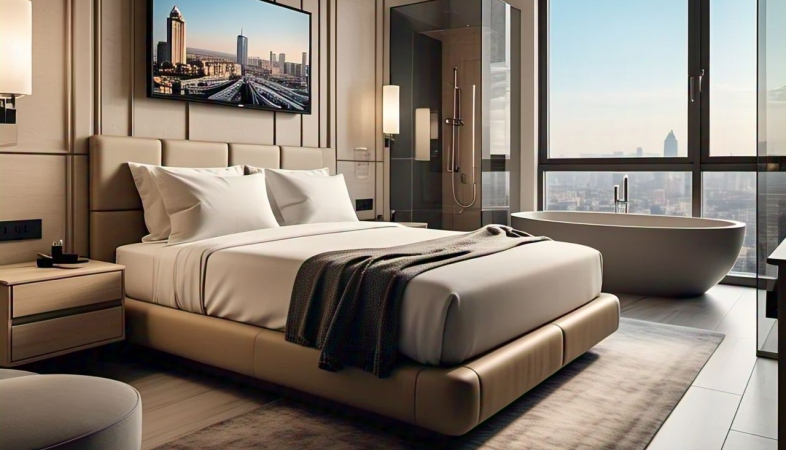Designing a Hotel That Promotes Health: The Role of Wellness in Modern Hospitality
From the physical space to the services offered, wellness is now at the forefront of hotel design and operation.
In today’s fast-paced world, wellness has become an
essential aspect of the hospitality industry. Guests are no longer just looking
for a comfortable place to stay; they seek hotels that promote their overall
well-being. With increasing awareness around health and mental wellness, the
hospitality sector has recognized the need to design hotels that provide an
environment conducive to relaxation, rejuvenation, and fitness. From the
physical space to the services offered, wellness is now at the forefront of hotel
design and operation.
A hotel designed with wellness in mind goes beyond just providing a gym or spa. It is about creating an immersive environment that encourages guests to focus on their health throughout their stay. The very architecture of wellness hotels reflects this philosophy. Open, airy spaces with natural lighting are key to creating a calming atmosphere. Large windows that let in natural light, coupled with the use of natural materials like wood, stone, and organic textiles, help foster a sense of tranquility. These elements work together to reduce stress and create a space where guests can unwind from their busy lives.
Wellness-focused hotels are also paying close attention to the air quality within their rooms and common areas. With air purifiers, natural ventilation, and the use of non-toxic materials, these hotels ensure that guests breathe clean and fresh air. Air quality is a major contributor to overall health, and incorporating green building materials and systems that maintain proper ventilation helps guests feel comfortable and energized during their stay.
Another important aspect of wellness hotel design is sound management. Sound pollution, especially in city-based hotels, can be detrimental to a guest's experience. To address this, many wellness hotels use soundproofing techniques, such as double-glazed windows and acoustic panels, to minimize noise. These measures allow guests to enjoy a peaceful and restorative environment, promoting better sleep and relaxation. Creating serene environments is especially critical in public spaces such as spas, lounges, and dining areas, where guests can take a break from the noise of daily life.
The wellness trend also extends to hotel amenities. Many hotels now offer fitness studios that go beyond the traditional gym setup, featuring group exercise classes such as yoga, Pilates, and meditation. These spaces are often designed to inspire guests to focus on their physical and mental health. Meditation rooms, designed with soft lighting, calming scents, and minimal distractions, offer guests a quiet sanctuary where they can relax and engage in mindfulness practices. Additionally, health-conscious food options are now available at many wellness-focused hotels. Guests can enjoy menus curated with organic, locally sourced ingredients, offering nutritious meals that complement their wellness journey.
Guest rooms themselves are thoughtfully designed to support health and relaxation. High-quality bedding, including hypoallergenic pillows and mattresses, ensures guests get a restful sleep, which is vital to their overall well-being. Smart technology in the rooms, such as sleep-tracking devices, climate control systems, and mood lighting, helps guests tailor their environment to their personal preferences, promoting a better sleep cycle and a more restful stay.
Bathrooms in wellness hotels are also optimized for relaxation and health. Many hotels feature spa-like bathrooms equipped with rain showers, deep soaking tubs, and luxurious organic bath products. The design of these spaces encourages guests to indulge in self-care rituals, whether it's enjoying a long bath or practicing mindful skin care. Some wellness hotels even integrate private saunas or steam rooms into the guest rooms, offering a personal sanctuary for relaxation and detoxification.
Beyond the hotel’s physical features, wellness is also reflected in the services and experiences offered. Spa treatments, personalized wellness programs, and fitness classes are now standard offerings in many hotels that prioritize guest health. These services are designed to cater to guests' individual needs, whether they are looking for relaxation, detoxification, or mental clarity. Wellness retreats or packages often include nutrition counseling, fitness assessments, and guided meditations to enhance the guests’ overall experience and help them feel rejuvenated both physically and mentally.
The rise of wellness tourism has led hotels to recognize that their role extends far beyond just providing a place to stay. They are now seen as destinations that offer holistic experiences for the mind, body, and soul. The concept of health is now seamlessly integrated into every aspect of the hotel, from the design and amenities to the services and experiences offered. The goal is to create an environment where guests not only feel relaxed but also leave feeling revitalized and restored.
The integration of wellness into hotel design isn’t just a trend; it’s a response to the increasing demand for health-conscious travel experiences. As travelers continue to prioritize their health and well-being, the hospitality industry will likely see an even greater shift toward wellness-focused design and services. By promoting health and relaxation, hotels can offer guests a unique and rejuvenating experience, setting them apart in a competitive market.
In the coming years, the role of wellness in hotel design will continue to evolve, with more hotels adopting sustainable, health-promoting features. Whether through mindful design, innovative amenities, or wellness-focused services, hotels are redefining what it means to offer luxury and comfort, ensuring that health and well-being are at the heart of the modern hospitality experience.
.png)




























